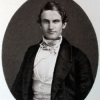Francis Parkman

Francis Parkman
Francis Parkman, Jr.was an American historian, best known as author of The Oregon Trail: Sketches of Prairie and Rocky-Mountain Life and his monumental seven-volume France and England in North America. These works are still valued as historical sources and as literature. He was also a leading horticulturist, briefly a professor of Horticulture at Harvard University and author of several books on the topic. Parkman was a trustee of the Boston Athenæum from 1858 until his death in 1893...
NationalityAmerican
ProfessionHistorian
Date of Birth16 September 1823
CountryUnited States of America
The growth of New England was a result of the aggregate efforts of a busy multitude, each in his narrow circle toiling for himself, to gather competence or wealth. The expansion of New France was the achievement of a gigantic ambition striving to grasp a continent. It was a vain attempt.
In the middle of the sixteenth century, Spain was the incubus of Europe. Gloomy and portentous, she chilled the world with her baneful shadow.
Our New England climate is mild and equable compared with that of the Platte.
Early on the next morning we reached Kansas, about five hundred miles from the mouth of the Missouri.
France built its best colony on a principle of exclusion, and failed; England reversed the system, and succeeded.
If any pale student, glued to his desk, here seek an apology for a way of life whose natural fruits is that pallid and emasculate scholarship of which New England has had too many examples, it will be far better that this sketch had not been written. For the student there is, in its season, no better place than the saddle, and no better companion than the rifle or the oar.
America was still a land of wonder. The ancient spell still hung unbroken over the wild, vast world of mystery beyond the sea,-a land of romance, adventure, and gold.
Faithfulness to the truth of history involves far more than a research, however patient and scrupulous, into special facts. Such facts may be detailed with the most minute exactness, and yet the narrative, taken as a whole, may be unmeaning or untrue. The narrator must seek to imbue himself with the life and spirit of the time. He must study events in their bearings near and remote; in the character, habits, and manners of those who took part in them. He must himself be, as it were, a sharer or a spectator of the action he describes.
Art, industry, and commerce, so long crushed and overborne, were stirring into renewed life, and a crowd of adventurous men, nurtured in war and incapable of repose, must seek employment for their restless energies in fields of peaceful enterprise.
Spanish civilization crushed the Indian. English civilization scorned and neglected him. French civilization embraced and cherished him.